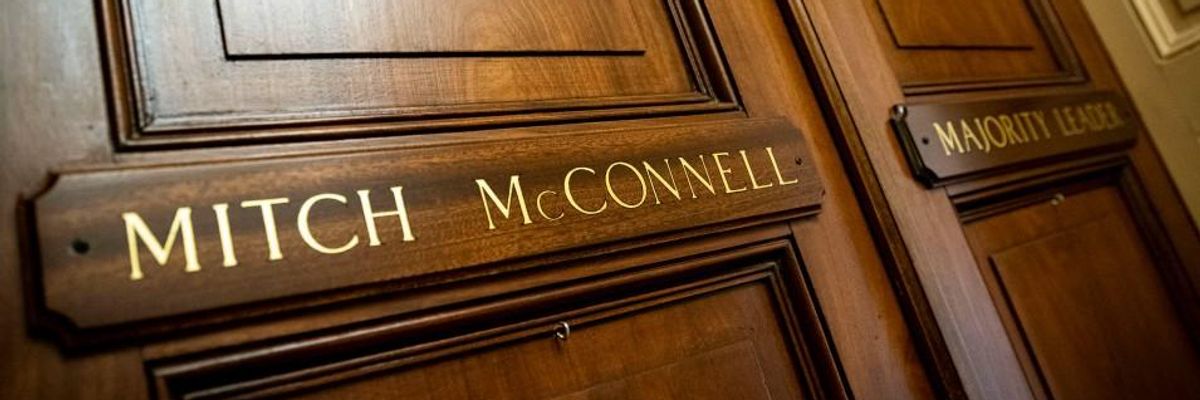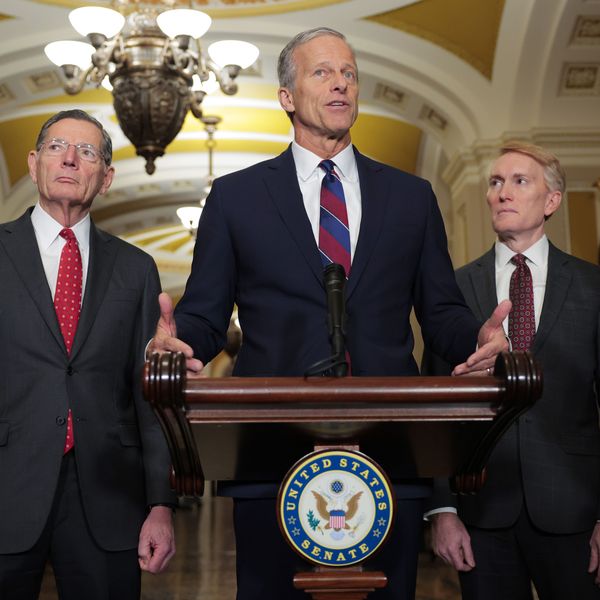
The entrance to the office of Senate Majority Leader Mitch McConnell (R-Ky.) in the U.S. Capitol on September 28, 2020 in Washington, D.C. (Photo: Al Drago/Getty Images)
As McConnell Vows No Vote on Major Covid Skinny Relief Bill, GOP Seen as Strategizing for Austerity Under Biden
Instead of helping Trump's chances of electoral victory, Republicans appear to be jockeying to "restrain a Biden administration on federal spending."
Senate Majority Leader Mitch McConnell on Thursday firmly rejected putting a $1.8 trillion or higher pandemic relief package on the floor for a vote--a statement that came a day after reporting suggested the Kentucky Republican's refusal is part of a broader GOP effort to set the stage for an austerity-focused sabotage of the economy if Joe Biden wins the election.
"That's not what I'm going to put on the floor," McConnell (R-Ky.) told reporters in Kentucky of any compromise between the White House's $1.8 trillion and House Democrats' $2.2 trillion proposals.
McConnell said that the $1.8 trillion figure is "where the administration's willing to go."
"My members think what we laid out, a half a trillion dollars, highly targeted, is the best way to go," he said.
President Donald Trump even told Fox News Thursday--while taking swipes at House Speaker Nancy Pelosi--that he would "absolutely" consider a higher amount than the $1.8 trillion proposal.
While Pelosi and Treasury Secretary Steven Mnuchin continued negotiations over a potential deal, they remained at a standstill as of Thursday. Struggling Americans, meanwhile, still see no further aid to help weather the economic impact of the pandemic. A new study puts that hardship in focus, revealing that there are now eight million more poor Americans than there were in May, as help from temporarily expanded unemployment benefits and one-time cash injections dried up.
\u201cSome headlines this week:\n\n-- +20 states hit COVID highs in 7 day averages\n\n-- 8 million fall into poverty w/ aid expiring\n\n-- Jobless claims up today near ~900K, higher than expected\n\n-- Layoffs in airlines, restaurants, hotels\n\n-- Agreement on aid package remains out of reach\u201d— Jeff Stein (@Jeff Stein) 1602771125
So "given that spending more now would likely boost Trump's reelection chances, why aren't Senate Republicans on board?" the Washington Post's Greg Sargent wrote in a column Wednesday.
To suss out Senate Republicans' thinking, Sargent pointed to a key portion of Bloomberg reporting on Wednesday:
A GOP strategist who has been consulting with Senate campaigns said Republicans have been carefully laying the groundwork to restrain a Biden administration on federal spending and the budget deficit by talking up concerns about the price tag for another round of virus relief. The thinking, the strategist said, is that it would be very hard politically to agree on spending trillions more now and then in January suddenly embrace fiscal restraint.
As Sargent sees it, "Republicans almost certainly suspect Trump will lose even with a big stimulus and already hope to put an incoming President Joe Biden in a fiscal straitjacket, saddling him with the terrible politics of a grueling recovery."
"A big package now under a GOP president would make that harder to get away with," he added.
"The calculation," Sargent suggests, "is probably not just about avoiding the hypocrisy of spending big now and embracing austerity under a Democratic president" but also avoiding a legislative aid package that could deliver a boosted economy to a Biden White House.
An Urgent Message From Our Co-Founder
Dear Common Dreams reader, The U.S. is on a fast track to authoritarianism like nothing I've ever seen. Meanwhile, corporate news outlets are utterly capitulating to Trump, twisting their coverage to avoid drawing his ire while lining up to stuff cash in his pockets. That's why I believe that Common Dreams is doing the best and most consequential reporting that we've ever done. Our small but mighty team is a progressive reporting powerhouse, covering the news every day that the corporate media never will. Our mission has always been simple: To inform. To inspire. And to ignite change for the common good. Now here's the key piece that I want all our readers to understand: None of this would be possible without your financial support. That's not just some fundraising cliche. It's the absolute and literal truth. We don't accept corporate advertising and never will. We don't have a paywall because we don't think people should be blocked from critical news based on their ability to pay. Everything we do is funded by the donations of readers like you. Will you donate now to help power the nonprofit, independent reporting of Common Dreams? Thank you for being a vital member of our community. Together, we can keep independent journalism alive when it’s needed most. - Craig Brown, Co-founder |
Senate Majority Leader Mitch McConnell on Thursday firmly rejected putting a $1.8 trillion or higher pandemic relief package on the floor for a vote--a statement that came a day after reporting suggested the Kentucky Republican's refusal is part of a broader GOP effort to set the stage for an austerity-focused sabotage of the economy if Joe Biden wins the election.
"That's not what I'm going to put on the floor," McConnell (R-Ky.) told reporters in Kentucky of any compromise between the White House's $1.8 trillion and House Democrats' $2.2 trillion proposals.
McConnell said that the $1.8 trillion figure is "where the administration's willing to go."
"My members think what we laid out, a half a trillion dollars, highly targeted, is the best way to go," he said.
President Donald Trump even told Fox News Thursday--while taking swipes at House Speaker Nancy Pelosi--that he would "absolutely" consider a higher amount than the $1.8 trillion proposal.
While Pelosi and Treasury Secretary Steven Mnuchin continued negotiations over a potential deal, they remained at a standstill as of Thursday. Struggling Americans, meanwhile, still see no further aid to help weather the economic impact of the pandemic. A new study puts that hardship in focus, revealing that there are now eight million more poor Americans than there were in May, as help from temporarily expanded unemployment benefits and one-time cash injections dried up.
\u201cSome headlines this week:\n\n-- +20 states hit COVID highs in 7 day averages\n\n-- 8 million fall into poverty w/ aid expiring\n\n-- Jobless claims up today near ~900K, higher than expected\n\n-- Layoffs in airlines, restaurants, hotels\n\n-- Agreement on aid package remains out of reach\u201d— Jeff Stein (@Jeff Stein) 1602771125
So "given that spending more now would likely boost Trump's reelection chances, why aren't Senate Republicans on board?" the Washington Post's Greg Sargent wrote in a column Wednesday.
To suss out Senate Republicans' thinking, Sargent pointed to a key portion of Bloomberg reporting on Wednesday:
A GOP strategist who has been consulting with Senate campaigns said Republicans have been carefully laying the groundwork to restrain a Biden administration on federal spending and the budget deficit by talking up concerns about the price tag for another round of virus relief. The thinking, the strategist said, is that it would be very hard politically to agree on spending trillions more now and then in January suddenly embrace fiscal restraint.
As Sargent sees it, "Republicans almost certainly suspect Trump will lose even with a big stimulus and already hope to put an incoming President Joe Biden in a fiscal straitjacket, saddling him with the terrible politics of a grueling recovery."
"A big package now under a GOP president would make that harder to get away with," he added.
"The calculation," Sargent suggests, "is probably not just about avoiding the hypocrisy of spending big now and embracing austerity under a Democratic president" but also avoiding a legislative aid package that could deliver a boosted economy to a Biden White House.
Senate Majority Leader Mitch McConnell on Thursday firmly rejected putting a $1.8 trillion or higher pandemic relief package on the floor for a vote--a statement that came a day after reporting suggested the Kentucky Republican's refusal is part of a broader GOP effort to set the stage for an austerity-focused sabotage of the economy if Joe Biden wins the election.
"That's not what I'm going to put on the floor," McConnell (R-Ky.) told reporters in Kentucky of any compromise between the White House's $1.8 trillion and House Democrats' $2.2 trillion proposals.
McConnell said that the $1.8 trillion figure is "where the administration's willing to go."
"My members think what we laid out, a half a trillion dollars, highly targeted, is the best way to go," he said.
President Donald Trump even told Fox News Thursday--while taking swipes at House Speaker Nancy Pelosi--that he would "absolutely" consider a higher amount than the $1.8 trillion proposal.
While Pelosi and Treasury Secretary Steven Mnuchin continued negotiations over a potential deal, they remained at a standstill as of Thursday. Struggling Americans, meanwhile, still see no further aid to help weather the economic impact of the pandemic. A new study puts that hardship in focus, revealing that there are now eight million more poor Americans than there were in May, as help from temporarily expanded unemployment benefits and one-time cash injections dried up.
\u201cSome headlines this week:\n\n-- +20 states hit COVID highs in 7 day averages\n\n-- 8 million fall into poverty w/ aid expiring\n\n-- Jobless claims up today near ~900K, higher than expected\n\n-- Layoffs in airlines, restaurants, hotels\n\n-- Agreement on aid package remains out of reach\u201d— Jeff Stein (@Jeff Stein) 1602771125
So "given that spending more now would likely boost Trump's reelection chances, why aren't Senate Republicans on board?" the Washington Post's Greg Sargent wrote in a column Wednesday.
To suss out Senate Republicans' thinking, Sargent pointed to a key portion of Bloomberg reporting on Wednesday:
A GOP strategist who has been consulting with Senate campaigns said Republicans have been carefully laying the groundwork to restrain a Biden administration on federal spending and the budget deficit by talking up concerns about the price tag for another round of virus relief. The thinking, the strategist said, is that it would be very hard politically to agree on spending trillions more now and then in January suddenly embrace fiscal restraint.
As Sargent sees it, "Republicans almost certainly suspect Trump will lose even with a big stimulus and already hope to put an incoming President Joe Biden in a fiscal straitjacket, saddling him with the terrible politics of a grueling recovery."
"A big package now under a GOP president would make that harder to get away with," he added.
"The calculation," Sargent suggests, "is probably not just about avoiding the hypocrisy of spending big now and embracing austerity under a Democratic president" but also avoiding a legislative aid package that could deliver a boosted economy to a Biden White House.

